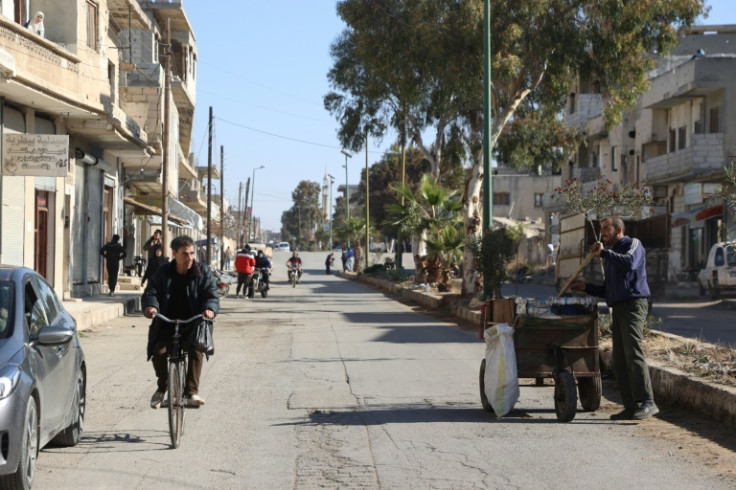
The EU's envoy to Syria headed to Damascus Monday to hold talks with the country's new Islamist rulers, just over a week after president Bashar al-Assad's ouster ended decades of brutal rule and civil war.
The move from Brussels came after the United States and Britain said they had made contact with the new authorities in the Syrian capital.
After facing down a democracy revolt in 2011 with a crackdown that sparked 13 years of civil war, Assad fled after a rebel offensive brought his rule to a stunning end.
The end of five decades of rule by the Assad clan sparked celebrations across Syria and beyond, with governments around the world also welcoming its downfall.
Governments are carefully calibrating their response to the new reality, especially in countries where the Hayat Tahrir al-Sham (HTS) rebel group that is now in charge remains proscribed as a "terrorist" organisation.
HTS is rooted in Syria's branch of Al-Qaeda, but since toppling Assad has sought to moderate its tone, vowing to protect members of all religious communities in the multi-confessional, multi-ethnic country.
"Our top diplomat in Syria will go to Damascus today. We'll have the contacts there," EU foreign policy chief Kaja Kallas said on Monday.
"We can't leave a vacuum," she said, adding: "For us, it's not only the words, but we want to see the deeds going to the right direction. So not only what they are saying, but also what they are doing."
The UN envoy to Syria, Geir Pedersen, told HTS leader Abu Mohammed al-Jolani Syria must have a "credible and inclusive" transition, according to a statement on Monday.
Pedersen also met interim prime minister Mohammad al-Bashir, and underlined "the intention of the United Nations to render all assistance to the Syrian people".
To the victims of some of Assad's worst atrocities, the end of his era brought a glimmer of hope that they might find closure.
As HTS and its allies advanced through Syria, taking city after city, they opened prison gates to liberate people suspected of dissent who had been held for days, months, years and even decades.
"We want our children, alive, dead, burned, ashes, buried in mass graves... just tell us," Ayoush Hassan, 66, told AFP at Saydnaya, one of the prisons Assad used to strike fear into Syrian society.
She travelled to the prison in Damascus from her home in northern Syria, but could find no trace of her missing son.
According to the Syrian Observatory for Human Rights, more than 100,000 people died in Syria's jails and detention centres from 2011.
A Qatari delegation is also in Syria to meet transitional government officials and pledge "full commitment to supporting the Syrian people".
Qatar's embassy is set to resume operations Tuesday, 13 years after closing in the early stages of the anti-Assad uprising.
Turkey, a key backer of some of the rebel groups that ousted Assad, reopened its embassy in Damascus on Saturday.
Both Britain and the United States also confirmed they were in touch with HTS, despite officially considering the organisation a "terrorist" group.
"We can have diplomatic contact and so we do have diplomatic contact," British Foreign Minister David Lammy said as he announced an aid package for Syrians.
A French diplomatic team is also due in Damascus on Tuesday to "retake possession of our real estate" and make "initial contact" with the new authorities, acting Foreign Minister Jean-Noel Barrot said.
They will also be "evaluating the urgent needs of the population".
Ukrainian President Volodymyr Zelensky said his country was coordinating on providing aid including wheat, flour and oil to Syria.
A cautious sense of calm is returning to many cities, but Damascus's interim governor acknowledged that major obstacles lie ahead.
"The challenges we are facing right now are the massive destruction of the institutional structure in terms of human resources, local economy, and the social structure," said Maher Marwan.
"This is a reality that requires great effort and awareness, in addition to solidarity by everyone at this phase."
Assad was propped up by key allies including Lebanon's Hezbollah militant group, Iran, and Russia, whose foreign ministry said Sunday it had evacuated some diplomatic staff from Syria.
They left "by a special flight of the Russian Air Force from the Hmeimim airbase," the ministry said.
The rebel advance began on November 27, as a ceasefire took effect in the Israel-Hezbollah war in Lebanon, which battered the militant group.
Both Israel and Turkey have carried out military strikes inside Syria since Assad's fall.
Israeli Prime Minister Benjamin Netanyahu has insisted his country has "no interest in confronting Syria", despite launching hundreds of strikes over the past week.
"Israel's policy toward Syria will be determined by the evolving reality on the ground," he said in a video statement.
Those strikes continued early Monday, with the Syrian Observatory for Human Rights war monitor reporting raids on military sites in the coastal Tartus region.
The UK-based monitor, which relies on a network of sources inside Syria, said the raids were "the heaviest strikes" in the area in more than a decade.
And Israel's government on Sunday approved a plan to double the population in the Israeli-annexed Golan Heights.









